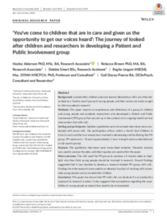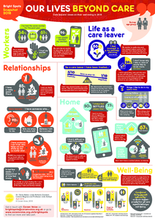Displaying 481 - 490 of 991
This chapter from the book Leaving Care and the Transition to Adulthood explores progress towards realizing the rights of young people in and leaving out of home care in Australia, Sweden and the UK.
This chapter summarises a case that goes beyond traditional welfare archives to reveal a story of multi-generational welfare custody, exemplifying the historic ideology underpinning child welfare in Victoria, Australia.
This study aims to explore how care is perceived and practiced among Looked after children and care leavers (LACCL) and those with a duty of care for them.
This open access paper reports on experiences and reflections of a group of children and young people and academic researchers who developed a Patient and Public Involvement (PPI) group that was set up in the context of an ongoing health service intervention trial with Looked after children and care leavers (denoted as LAC).
The Care Pathways and Outcomes Study is a longitudinal study following 374 children who were in care and under five years old on 31/3/2000 in Northern Ireland. The study followed where the young people ended up living, whether they returned to their birth parents, went into kinship or non-relative foster care, or were adopted.
The aim of this study was to investigate the role of self-esteem as a mediator in the association between different types of child maltreatment (i.e., physical abuse, physical neglect, emotional abuse) and depressive symptomatology among a sample of adolescents in out-of-home care.
This PhD thesis focuses on the perceptions of children in care whilst they are still in care and subject to youth justice supervision. The findings are based on semi-structured interviews with 19 children in care attending various Youth Offending Teams in the North West of England.
This theoretical-empirical study is based on two particular case studies of families bringing up children from institutional care in Slovakia.
This snapshot summarises the findings from the responses of 474 16-25 year old care leavers who completed the Your Life Beyond Care (YLBC) survey in 6 local authorities in England - an overall response rate of 30%. This snapshot gives an insight into how care leavers really feel about their lives.
This video from 1MillionHome shares the story of one children's home in Kenya, Agape, that transitioned from a "traditional orphanage" to a family reunification center.


